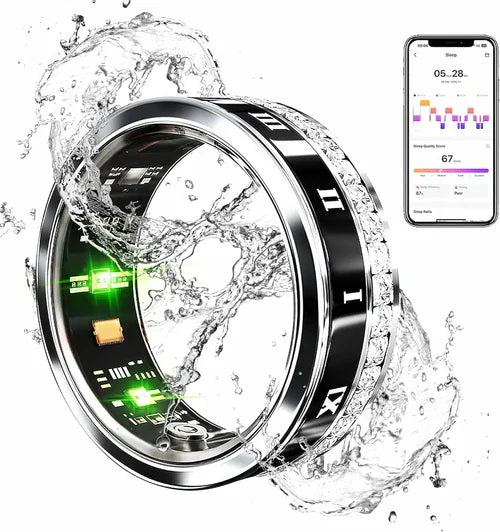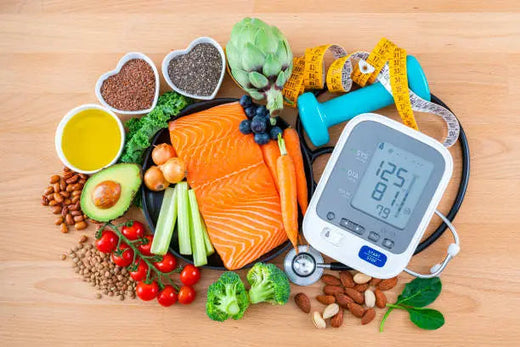
High Blood Pressure Symptoms: Essential Guide to Understanding Silent Hypertension
High blood pressure, also called the hypertension, is a health condition that affects millions of people around the world, but still, many of them do not know they have it. There is a reason why it is usually referred to as the 'silent killer'.
Did you know that almost 50% of the adults who have high blood pressure are not diagnosed with hypertension? This is because hypertension does not have any clear symptoms until the condition has already caused a substantial damage.
High blood pressure is considered when your blood pressure reads over 120/80 mmHg regularly. Although it may look harmless, letting hypertension go untreated can lead to severe health issues, like heart, brain, kidney, and eye problems.
This comprehensive guide will give an in-depth look at the gradual signs of high blood pressure and also clarify the reason why your doctor sometimes calls high blood pressure "silent hypertension." We provide effective strategies for early detection and prevention that the experts have backed up too. Whether you are worried about your blood pressure or trying to prevent it, this guide is your indispensable tool.
Key Takeaways:
- - High blood pressure symptoms often do not appear, and this affects almost 50% of adults who remain unaware of their condition.
- - A blood pressure measurement over 120/80 mm Hg means you have hypertension continuously, and it can develop into hazardous health issues if it is not treated.
- - Additionally, the disease can cause harm to some organs, like the heart, brain, kidneys, and vessels, which in turn can cause heart disease, stroke, and kidney failure.
- - Cigarette smoking and unhealthy eating, which are referred to as wrong lifestyle choices, are the main causes of high blood pressure, in addition to genetic and old age ones.
What is High Blood Pressure (Hypertension)
Blood pressure is the force exerted by blood against your artery walls when your heart beats. When it is always higher it is called high blood pressure or hypertension. Is it like water pressure in a garden hose when there is too much pressure on the hose, damage occurs over time.
Understanding Blood Pressure Numbers
Blood pressure readings are composed of two numbers. The top number (systolic) measures the pressure when your heart beats, while the bottom number (diastolic) measures the pressure between beats. A standard blood pressure value is less than 120/80 mmHg.
When Does Blood Pressure Become High?
According to the latest research and recommendations, the reported high systolic and diastolic pressure values are the defining factors.
- The top number or systolic pressure is 130 or more
- The lower number or diastolic pressure is 80 or more
The Silent Nature of Hypertension
Most of the time, high blood pressure is the result of the very slow process, and the symptoms usually occur without noticing. That is why it is often termed as the "silently killing" disease. Most of the people are not even conscious of their having it till they undergo critical fatigue in their cardiovascular material.
Common Risk Factors
These are the most crucial aspects that can help increase the risk of hypertension:
- Age (the older you are, the greater the risk)
- Family history
- Being overweight or obese
- Physical inactivity
- High-sodium diet
- Excessive alcohol consumption
- Chronic stress
Impact on Your Health
Uncontrolled high blood pressure can cause complications for your health such as:
- Heart disease and heart attacks
- Stroke
- Kidney damage
- Vision problems
- Cognitive decline
Key TakeawayHigh blood pressure is a serious condition where blood consistently exerts too much force against artery walls, often without symptoms, making regular monitoring essential for early detection and prevention of health complications.
Understanding Silent Hypertension
Silent hypertension, also known as the "silent killer," is a disease that emerges without the recognition of the patients through the absence of obvious symptoms. By this way, the disease has become more challenging to tackle, as many people don't pick up on their condition until life-threatening situations happen.
Why Is It Called Silent?
In stark contrast to numerous health problems, high blood pressure is seldom foreshadowed. You may have a dangerously high blood pressure level for years without even feeling slightly uncomfortable or seeing any clear signs. This is why people need to keep having their blood pressure checked regularly, and it is particularly crucial for those of us who are at risk.
Hidden Dangers
Although you may feel just fine, silent high blood pressure can do damage in the background of your arteries, heart, or other organs. Increased stress on artery walls due to the continouos pressure against them results to some peoples serious health trouble if the condition is neglected. Think of a water hose that has been poured too much, it wears off with time, as the excessive pressure can cause erosion to the hose.
Detection Methods
Since silent high blood pressure does not come in a form of symptoms, the best way to know if it exists is through having a regular blood pressure check up. Wherever you are, be it at home, at the pharmacy, or with your doctor, these are your first action steps to counteract the invisible enemy.
Key TakeawaySilent high blood pressure often goes unnoticed but even then, it can give a rise to life-threatening diseases, so the primary goal of early diagnosis and prevention of complications is solved by regular blood pressure checks.
Warning Signs and Symptoms
The risk of being diagnosed with high blood pressure gradually increases over time without showing any symptoms, which is why it is highly important to look for signs that might suggest it. Though not every person has symptoms, awareness of some symptoms can motivate them to seek medical assistance soon.

Common Physical Symptoms
Morning headaches, particularly throbbing ones back of the head, may be experienced by many who have high blood pressure. Unaccountable dizziness along with frequent nosebleeds could also mean that the blood pressure raised. Some people observe more tiredness than usual or notice irregular heart patterns. Furthermore, transformed visibility, such as cloudy or double-eyed, might happen as annoyance with the blood vessels in the eyes rises with blood pressure.
Severe Warning Signs
For the treatment of severely elevated blood pressure, more serious symptoms may come to realization that ask for fast medical help. These incorporate:
- Extremely bruised heart
- Are in poor breathing
- Blood in the urine
- Very intense or totally unexpected fearful feelings
- The disorder or inability to talk properly
- Pounding the chest, neck, or ears
- Suddenly sight troubles
- Very harsh headache with nausea
The message here is clear: the mentioned symptoms are mostly observable only after the blood pressure comes to the dangerously high levels. Regular blood pressure measurement continues to be the most dependable way to recognize hypertension on time and prevent its complications.
Key TakeawayHigh blood pressure is a condition that is often developed without any noticeable symptoms but the warning signs such as severe headaches, visual changes, and chest pain can indicate ridiculously increasing pressure which demands immediate medical help.
Health Complications
The uncontrolled high blood pressure causes so many problems in your body. It influences many organs and systems at the same time. If not managed, a silent condition like this will slowly but inevitably damage your important organs and lead to severe health problems.
High Blood Pressure Impact on Heart and Blood Vessels
High blood pressure makes your heart work harder than necessary to pump blood throughout your body. This heart stress often causes such heart problems as various coronary arteries diseases and heart failure. The high constant pressure on your arteries also makes them less elastic hence they can be easily blocked.
As for atherosclerosis, this results in the decrease of blood circulation due to the narrowed blood vessels, causing high clumping of blood cells. This condition, specifically, the process of atherosclerosis, is accountable for some cases of heart attacks and some strokes. Apart from that, there is a likelihood of the weakened blood vessels having such sagging spots (aneurysms) that are fatal in case of their bursting.
Effects on Other Vital Organs
Your kidneys are served by numerous small blood vessels known as glomeruli which are the main filtering units of the organ of waste materials. Elevated blood pressure can injure them result to a kidney disease or worst-case scenario loss of the kidney. is another at-risk organ- hypertension can harm the blood vessels in your retina, therefore, you may have vision problems or even go blind.
The brain is one of the body parts that take the most damage from high blood pressure. The brain not easing the flow of blood through it can cause forgetfulness, troubles with articulation, and vascular dementia in the worst scenario. Severe conditions arise when the vessels in the brain get choked or broken leading to stroke.
The sexual impairment is among the other complications which are not talked about with blood pressure. Men can suffer from erectile dysfunction, while women may experience low sexual desire and vaginal dryness. These malfunctions result from the fact that high blood pressure restricts the blood supply of the reproductive organs.
Key TakeawayUncontrolled high blood pressure can severely harm your body in multiple ways since blood pressure and vessels are the heart, the brain, and kidneys, which the heart pumps the blood to and the blood vessels carry the blood on its way, so life-threatening conditions which should be prevented by taking care and controlling regularly
Risk Factors and Causes
Modifiable Risk Factors
Bad dietary habits, such as eating too much salt and not enough potassium, are a primary cause of high blood pressure. Physical inactivity and the engagement in a sedentary lifestyle are the utmost contributors of hypertension.
Abnormal alcohol intake and smoke are the biggest reasons for hypertension. Fat rich or obese people have to bear in health problems are both related to possible LVDD in obese
Chronic stress can also lead to temporary spikes in blood pressure, and if persistent, may contribute to long-term hypertension. Poor sleep quality and sleep disorders like sleep apnea are increasingly recognized as risk factors.

Non-modifiable Risk Factors
Age is a meaningful risk factor behind the beginning of hypertension and the risk goes up as you get older. Men are the most likely group to develop hypertension at an earlier stage; for women, the risk goes up due to menopause.
Family history and genetics can make you more susceptible to high blood pressure. You run the risk of becoming hypertensive due to a family history of hypertension. Some ethnic.[IN]dissect effect of some specific group such as African Americans in causin.g of high pressures.
New diseases, for example HD, diabetics, and the endocrine disorder can develop secondary hypertension. Moreover, some drugs such as contraceptive pills, decongestants and certain analgesics may also enhance blood pressure.
Key TakeawayThe high blood pressure risk factors comprise the modifiable ones such as the way people eat and their lifestyle but also the unavoidable ones such as age, genetics, and some certain illnesses.
Diagnosis and Monitoring
Regular measurements of blood pressure are needed to detect the sickness in time and prevent it properly. As hypertension is typically asymptomatic, the best protecting measure is having your purity controlled regularly.
Professional Measurements
At the medical office, the nurse or the doctor will measure your blood pressure three or more times using a blood pressure cuff. Besides, they will need to check both arms with you sitting or lying down. The first step of the diagnosis or progression of the illness can be guaranteed by the accuracy of the measurements and the establishment of the baseline for future monitoring.
Home Monitoring
If you do so, you can learn your body's blood pressure changes and the reasons causing them. You can also use a time-validated automatic blood pressure monitor, and then take readings per day. You will thus be able to ferret out the reasons for your elevated (or low) blood pressure, and the knowledge will aid your healthcare provider in planning your care accordingly.
Ambulatory Blood Pressure Monitoring
24-hours ambulatory measuring may be advised for those who have to do the monitoring. The person is strapped with a mechanism that records activities throughout the natural day and night cardiac activities. This test will find which is the best lifestyle change to help your blood pressure.
Smart Watches and Smart Rings: Monitoring Blood Pressure
Being an individual who takes interest in technological advancements, I have watched the progress and trends of wearable health monitoring gadgets over the years. Today, I would like to share information about how smart watches and smart rings are being used to monitor blood pressure.
The pros of smart watches and smart rings in blood pressure monitoring can include the following:
Convenience: It is a simple task for people to take measurements whenever they wish, whenever they are
Continuous monitoring: The ability of some of the devices to record data over time
Early detection: Because it is going to be capable of identifying possible health issues before they become a problem
Improved consciousness: It gives the possibility for the users of the devices to have a better approach to their health by tracking their health more actively and participating on a higher level
To sum up, the new technologies have advanced smart watches and smart rings and now they are capable of monitoring blood pressure. Still, the important thing to remember is that they should be seen as a perfect supplementary instrument, and the ultimate decisions regarding your health must be made by qualified doctors.
> Further Reading: Unlocking 24/7 Blood Pressure Tracking with Smart Ring Technology
Frequency of Monitoring
Here are the blood pressure checkup regularity recommendations by the American Heart Association:
- People aged 18-40 with a regular blood pressureEvery 2 years
- People above 40 years old or the ones with higher risksAt least once per year
A hypertensive individual is usually advised by his doctor to measure his blood pressure more often.
Key Takeaway:
Regular blood pressure monitoring through professional measurements, home tracking, and sometimes 24-hour monitoring helps detect and manage hypertension effectively, with frequency varying based on individual risk factors.
Treatment Approaches
Managing high blood pressure effectively requires a comprehensive approach that combines lifestyle modifications with medical interventions. Let's explore the key treatment strategies that can help control hypertension.
Lifestyle Changes
Making positive changes to your daily habits plays a crucial role in managing blood pressure levels. Regular physical activity, even moderate exercises like brisk walking for 30 minutes daily, can significantly impact your numbers. Adopting a heart-healthy diet, particularly the DASH (Dietary Approaches to Stop Hypertension) eating plan, can lower blood pressure by up to 11 points.
Reducing sodium intake to less than 2,300 mg per day and maintaining a healthy weight are also essential steps. Studies show that losing just 5-10 pounds can reduce blood pressure by 5 mmHg. Additionally, limiting alcohol consumption and quitting smoking can help improve overall cardiovascular health.
Medical Treatment
When lifestyle changes alone aren't sufficient, healthcare providers may prescribe medications to help control blood pressure. Common medications include:
- Diuretics (water pills) to help your body eliminate excess sodium and water
- ACE inhibitors or ARBs to relax blood vessels
- Beta-blockers to reduce heart rate and blood pressure
- Calcium channel blockers to relax blood vessels and reduce heart rate
It's important to note that medication effectiveness varies among individuals, and your doctor may need to adjust dosages or try different combinations to find the most suitable treatment plan. Regular monitoring and follow-up appointments are essential to ensure the treatment remains effective.
Key TakeawaySuccessful blood pressure management typically requires a combination of lifestyle modifications and appropriate medical treatment, tailored to individual needs and regularly monitored by healthcare professionals.
Conclusion
Understanding and managing high blood pressure is crucial for safeguarding your long-term health. By recognizing the subtle signs and taking proactive steps, you can prevent the serious complications associated with untreated hypertension. Remember, even without obvious symptoms, regular blood pressure monitoring remains your best defense against this silent condition. Don't wait for warning signs to appear – schedule regular check-ups with your healthcare provider and maintain a blood pressure diary. Simple lifestyle changes like adopting a heart-healthy diet, regular exercise, and stress management can make a significant difference in managing your blood pressure levels. If you're experiencing any symptoms discussed in this guide, especially during a hypertensive crisis, seek immediate medical attention. Take control of your cardiovascular health today. With proper awareness, regular monitoring, and lifestyle modifications, you can effectively manage your blood pressure and reduce the risk of serious health complications. Your heart health journey starts with that first step toward awareness and action.






![Blood Pressure Chart Guide: Understanding Your Readings for Better Health [2025]](http://bkwat.com/cdn/shop/articles/Blood_Pressure_Chart_Guide.jpg?v=1734339250&width=612)

